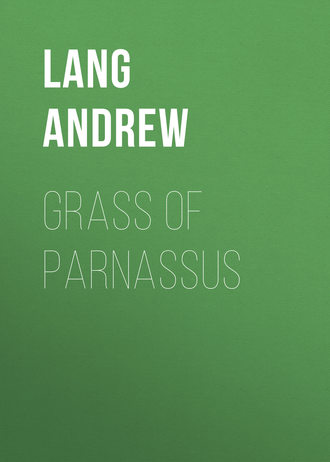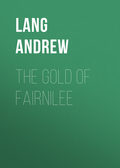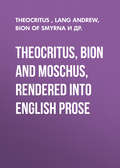полная версия

Lang Andrew
Grass of Parnassus
VERSES
MARTIAL IN TOWN
Last night, within the stifling train,
Lit by the foggy lamp o’erhead,
Sick of the sad Last News, I read
Verse of that joyous child of Spain,
Who dwelt when Rome was waxing cold,
Within the Roman din and smoke.
And like my heart to me they spoke,
These accents of his heart of old: —
“Brother, had we but time to live,
And fleet the careless hours together,
With all that leisure has to give
Of perfect life and peaceful weather,
“The Rich Man’s halls, the anxious faces,
The weary Forum, courts, and cases
Should know us not; but quiet nooks,
But summer shade by field and well,
But county rides, and talk of books,
At home, with these, we fain would dwell!
“Now neither lives, but day by day
Sees the suns wasting in the west,
And feels their flight, and doth delay
To lead the life he loveth best.”
So from thy city prison broke,
Martial, thy wail for life misspent,
And so, through London’s noise and smoke
My heart replies to the lament.
For dear as Tagus with his gold,
And swifter Salo, were to thee,
So dear to me the woods that fold
The streams that circle Fernielea!
APRIL ON TWEED
As birds are fain to build their nest
The first soft sunny day,
So longing wakens in my breast
A month before the May,
When now the wind is from the West,
And Winter melts away.
The snow lies yet on Eildon Hill,
But soft the breezes blow.
If melting snows the waters fill,
We nothing heed the snow,
But we must up and take our will, —
A fishing will we go!
Below the branches brown and bare,
Beneath the primrose lea,
The trout lies waiting for his fare,
A hungry trout is he;
He’s hooked, and springs and splashes there
Like salmon from the sea!
Oh, April tide’s a pleasant tide,
However times may fall,
And sweet to welcome Spring, the Bride,
You hear the mavis call;
But all adown the water-side
The Spring’s most fair of all.
TIRED OF TOWNS
‘When we spoke to her of the New Jerusalem, she said she would rather go to a country place in Heaven.’
Letters from the Black Country.
I’m weary of towns, it seems a’most a pity
We didn’t stop down i’ the country and clem,
And you say that I’m bound for another city,
For the streets o’ the New Jerusalem.
And the streets are never like Sheffield, here,
Nor the smoke don’t cling like a smut to them;
But the water o’ life flows cool and clear
Through the streets o’ the New Jerusalem.
And the houses, you say, are of jasper cut,
And the gates are gaudy wi’ gold and gem;
But there’s times I could wish as the gates was shut —
The gates o’ the New Jerusalem.
For I come from a country that’s over-built
Wi’ streets that stifle, and walls that hem,
And the gorse on a common’s worth all the gilt
And the gold of your New Jerusalem.
And I hope that they’ll bring me, in Paradise,
To green lanes leafy wi’ bough and stem —
To a country place in the land o’ the skies,
And not to the New Jerusalem.
SCYTHE SONG
Mowers, weary and brown, and blithe,
What is the word methinks ye know,
Endless over-word that the Scythe
Sings to the blades of the grass below?
Scythes that swing in the grass and clover,
Something, still, they say as they pass;
What is the word that, over and over,
Sings the Scythe to the flowers and grass?
Hush, ah hush, the Scythes are saying,
Hush, and heed not, and fall asleep;
Hush, they say to the grasses swaying,
Hush, they sing to the clover deep!
Hush– ’tis the lullaby Time is singing —
Hush, and heed not, for all things pass,
Hush, ah hush! and the Scythes are swinging
Over the clover, over the grass!
PEN AND INK
Ye wanderers that were my sires,
Who read men’s fortunes in the hand,
Who voyaged with your smithy fires
From waste to waste across the land,
Why did you leave for garth and town
Your life by heath and river’s brink,
Why lay your gipsy freedom down
And doom your child to Pen and Ink?
You wearied of the wild-wood meal
That crowned, or failed to crown, the day;
Too honest or too tame to steal
You broke into the beaten way;
Plied loom or awl like other men,
And learned to love the guineas’ chink —
Oh, recreant sires, who doomed me then
To earn so few – with Pen and Ink!
Where it hath fallen the tree must lie.
’Tis over late for me to roam,
Yet the caged bird who hears the cry
Of his wild fellows fleeting home,
May feel no sharper pang than mine,
Who seem to hear, whene’er I think,
Spate in the stream, and wind in pine,
Call me to quit dull Pen and Ink.
For then the spirit wandering,
That slept within the blood, awakes;
For then the summer and the spring
I fain would meet by streams and lakes;
But ah, my Birthright long is sold,
But custom chains me, link on link,
And I must get me, as of old,
Back to my tools, to Pen and Ink.
A DREAM
Why will you haunt my sleep?
You know it may not be,
The grave is wide and deep,
That sunders you and me;
In bitter dreams we reap
The sorrow we have sown,
And I would I were asleep,
Forgotten and alone!
We knew and did not know,
We saw and did not see,
The nets that long ago
Fate wove for you and me;
The cruel nets that keep
The birds that sob and moan,
And I would we were asleep,
Forgotten and alone!
THE SINGING ROSE
‘La Rose qui chante et l’herbe qui égare.’
White Rose on the grey garden wall,
Where now no night-wind whispereth,
Call to the far-off flowers, and call
With murmured breath and musical
Till all the Roses hear, and all
Sing to my Love what the White Rose saith.
White Rose on the grey garden wall
That long ago we sung!
Again you come at Summer’s call, —
Again beneath my windows all
With trellised flowers is hung,
With clusters of the roses white
Like fragrant stars in a green night.
Once more I hear the sister towers
Each unto each reply,
The bloom is on those limes of ours,
The weak wind shakes the bloom in showers,
Snow from a cloudless sky;
There is no change this happy day
Within the College Gardens grey!
St. Mary’s, Merton, Magdalen – still
Their sweet bells chime and swing,
The old years answer them, and thrill
A wintry heart against its will
With memories of the Spring —
That Spring we sought the gardens through
For flowers which ne’er in gardens grew!
For we, beside our nurse’s knee,
In fairy tales had heard
Of that strange Rose which blossoms free
On boughs of an enchanted tree,
And sings like any bird!
And of the weed beside the way
That leadeth lovers’ steps astray!
In vain we sought the Singing Rose
Whereof old legends tell,
Alas, we found it not mid those
Within the grey old College close,
That budded, flowered, and fell, —
We found that herb called ‘Wandering’
And meet no more, no more in Spring!
Yes, unawares the unhappy grass
That leadeth steps astray,
We trod, and so it came to pass
That never more we twain, alas,
Shall walk the self-same way.
And each must deem, though neither knows,
That neither found the Singing Rose!
A REVIEW IN RHYME
A little of Horace, a little of Prior,
A sketch of a Milkmaid, a lay of the Squire —
These, these are ‘on draught’ ‘At the Sign of the Lyre!’
A child in Blue Ribbons that sings to herself,
A talk of the Books on the Sheraton shelf,
A sword of the Stuarts, a wig of the Guelph,
A lai, a pantoum, a ballade, a rondeau,
A pastel by Greuze, and a sketch by Moreau,
And the chimes of the rhymes that sing sweet as they go,
A fan, and a folio, a ringlet, a glove,
’Neath a dance by Laguerre on the ceiling above,
And a dream of the days when the bard was in love,
A scent of dead roses, a glance at a pun,
A toss of old powder, a glint of the sun,
They meet in the volume that Dobson has done!
If there’s more that the heart of a man can desire,
He may search, in his Swinburne, for fury and fire;
If he’s wise – he’ll alight ‘At the Sign of the Lyre!’
COLINETTE
FOR A SKETCH BY MR. G. LESLIE, R.A
France your country, as we know;
Room enough for guessing yet,
What lips now or long ago,
Kissed and named you – Colinette.
In what fields from sea to sea,
By what stream your home was set,
Loire or Seine was glad of thee,
Marne or Rhone, O Colinette?
Did you stand with maidens ten,
Fairer maids were never seen,
When the young king and his men
Passed among the orchards green?
Nay, old ballads have a note
Mournful, we would fain forget;
No such sad old air should float
Round your young brows, Colinette.
Say, did Ronsard sing to you,
Shepherdess, to lull his pain,
When the court went wandering through
Rose pleasances of Touraine?
Ronsard and his famous Rose
Long are dust the breezes fret;
You, within the garden close,
You are blooming, Colinette.
Have I seen you proud and gay,
With a patched and perfumed beau,
Dancing through the summer day,
Misty summer of Watteau?
Nay, so sweet a maid as you
Never walked a minuet
With the splendid courtly crew;
Nay, forgive me, Colinette.
Not from Greuze’s canvases
Do you cast a glance, a smile;
You are not as one of these,
Yours is beauty without guile.
Round your maiden brows and hair
Maidenhood and Childhood met
Crown and kiss you, sweet and fair,
New art’s blossom, Colinette.







